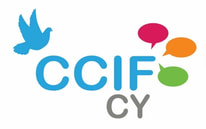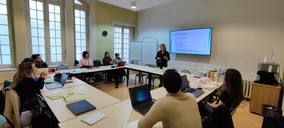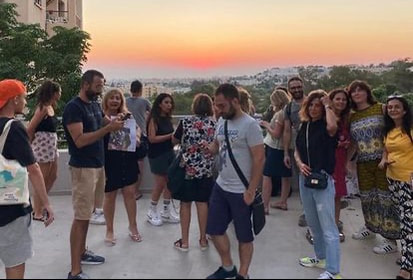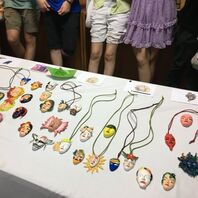Be the teacher of success
Top courses for effective teaching
English LanguageB1 Or B2
"Activate your English" Course for teachers and staff with B2 level of English who want to develop their language skills to be able to communicate and interact with confidence in class and in everyday situations by using the cultural context for creating learning content. Participants will join in on field projects to places of historical, geographical and environmental significance within the Cypriot heritage and way of life and use this as inspiration for creating learning content though context. Objectives: - Improve language skills, especially oral fluency, and enable them to incorporate English into classroom situations and daily life. - Develop awareness of a European Dimension in education as a meeting point for future participation in school partnerships and projects. Methodology: A communicative approach to language learning enhanced by using real contexts will help participants to develop their communicative skills in a very natural way. Group and task-based activities, field projects and oral and written presentations will enhance participants’ learning experience. Participants are encouraged to interact with each other and develop their communication skills in English while at the same time exploring and becoming part of a European dimension in education. That is why they will be encouraged to share their experience and ideas with colleagues from Cypriot schools and around Europe. DAY 1 - Welcome event, registration, getting to know each other - Towards a new model of education, building learning scenarios - Language focus: European Culture (literature, film, music, art) Vocabulary/ Pronunciation, conversation. Lab: Fairy Tales & Legends - Feedback, evaluation, reflection DAY 2 - Learning with ICT and Creative tools - How to use games designed to teach, learn or help students practice specific skills or content DAY 3 - Photo, or podcast or video making for educational purposes. Adopt and use visual resources - Group Workshop for practical creations for educational purposes - Distinct balance in creating educational and fun learning - Visit the archeological Park of Pafos DAY 4 - Creativity and digital art for transforming ideas in reality - Language & Learning Focus: Hobbies, Interests, and Networking – Relevant Vocabulary & Pronunciation/Task-based Learning: Talking about cultural heritage. - TOUR IN THE TOWN & traditional city center DAY5 - CLOSURE OF THE COURSE - presentation of group work, - review of the project, conclusions, certificates - Mini Cruise in the blue clear waters of Pafos (optional with extra cost) |
CLILOBJECTIVES
The course creates communicative situations so that participants can: 1.Improve their communication skills in English and develop practices for their classroom while implementing a CLIL approach; 2.Explore the potential of an inquiry-based project-work approach to CLIL through practical ideas for classroom management, lesson planning and materials development; METHODOLOGY Participants will be involved in inquiry-based project-work tasks and topics relevant to the CLIL classroom by using folklore, sports, symbols, art, society, etc. This methodology is an effective way of developing communication skills to create a framework for planning CLIL lessons and develop teaching materials relevant to their students’ interests. Participants will be also encouraged to share their experience and ideas with colleagues from Cyprus or other European schools. Assessment will be carried out prior to the course by means of analysis of participants’ interests. During the course, oral and written presentations will be completed to enhance participants’ learning. DAY 1 - Welcoming event and registration, getting to know each other. - Introduction - CLIL-specific teacher development: goal and method; course rationale and purpose; - CLIL-related online resources: recommendations; acknowledgements: course bibliography and references; introductory practice - Visit the Museum of Paphos and the Archeological Park, Roman mosaics, Paphos Medieval Castle & port DAY 2 - Basic concepts and main CLIL-related issues (defining CLIL: from abstract to concrete; - 5 dimensions of CLIL; common reasons for introducing CLIL; the 5 Cs of CLIL; criteria for producing quality CLIL learning materials; a shared vision for CLIL; assessment. DAY 3 - Teaching subjects, clear understanding of CLIL. Building your CLIL Portfolio - TOUR IN THE TOWN & traditional city center DAY 4 - Practical evaluation of sample CLIL materials (a workshop); data collection for the group work - A thematic extension (working with resistance to CLIL: three major concerns, and how to respond to them; the use of questions: ten tips for effective questioning in CLIL; a history of CLIL in 3 phases, impact and the future) DAY 5 - CLOSURE OF THE COURSE - Presentation of group work, - Review of the project, conclusions, certificates - Mini Cruise in the blue clear waters of Pafos (optional with extra cost) |
ICT - TEAM Work – ENTERPRENEURIAL MINDSETEntrepreneurship, ICT and communication are becoming embedded in policy and economic across Europe and they are essential skills for each professionals or citizens with a dynamic mindsets. The discovery of the importance and the role that today digital skills takes in every aspect of social and individual activities such as life, the society today’s knowledge has started an important process that should lead to the diffusion of conscious use of ICT in every context.
A practical course for teachers who wish to start their journey into ICT, incorporate the acquired skills into the class, work in a collaborative way within a team and develop students’ creativity by strengthening the entrepreneurial attitudes . Objectives: - Introduce the use of ICT tools and reflect on the importance of a technology-mediated education. - Enrich teaching and learning with useful ICT tools for recovering and sharing educational resources for team building & collaboration. - Work in a collaborative way and build team learning. - Entrepreneurship in school: an experiential approach, learn how to develop ideas, solve problems. Methodology: This course is based on a learning-by-doing principle which requires participants to explore ICT tools in a practical way. Hands-on workshops and collaborative group work will allow participants to understand and assimilate the content effectively. Through activities and field projects, participants should interact with each other and develop a sense of European dimension. Reflective journaling will enhance and complete their learning experience. DAY 1 - Welcome event, registration, Programme Rationale - Building your ICT portfolio - TOUR IN THE TOWN & traditional city center DAY 2 - Learn how to improve and develop ideas - Digital storytelling and creativity - Creativity & comics "Creativity is just connecting things.” (Steve Jobs). DAY 3 - Social Entrepreneurship in Education - Building career paths - Is It Feasible? - What Are Your Interests? - Case Study - Self-Branding and communication DAY 4 - ICT tools and management of digital content – creating digital learning activities - ICT tools for collaboration - using social media - ICT tools for classroom management & assessment DAY 5 - CLOSURE OF THE COURSE - Presentation of group work, - Review of the project, conclusions, certificates - Mini Cruise in the blue clear waters of Pafos (optional with extra cost) |
ASK for the NEW DATES and for the FULL PACKAGE!!!
Our courses are organized within the 4 priorities of Erasmus+:
- Inclusion and diversity;
- Digital Transformation, eg. ICT or STEM;
- Environment, climate change;
- Demoracy in EU;
COURSE FEES:
5 days, 400e/person
7 days, 560e/person
Confirmed dates:
19-23/6/2024
20-24/7/2024
6-10/8/2024
20-24/8/2024
16-10/9/2024
Read our privacy policy
Child Protection Policy of CCIF Cypruschild_protection_policy_of_ccif_cyprus.pdf





